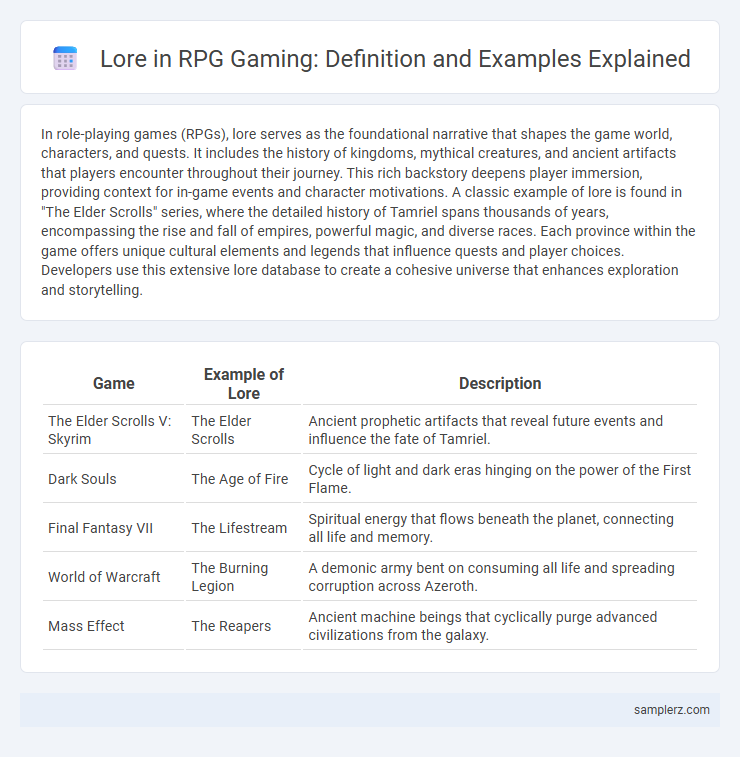In role-playing games (RPGs), lore serves as the foundational narrative that shapes the game world, characters, and quests. It includes the history of kingdoms, mythical creatures, and ancient artifacts that players encounter throughout their journey. This rich backstory deepens player immersion, providing context for in-game events and character motivations. A classic example of lore is found in "The Elder Scrolls" series, where the detailed history of Tamriel spans thousands of years, encompassing the rise and fall of empires, powerful magic, and diverse races. Each province within the game offers unique cultural elements and legends that influence quests and player choices. Developers use this extensive lore database to create a cohesive universe that enhances exploration and storytelling.
Table of Comparison
| Game | Example of Lore | Description |
|---|---|---|
| The Elder Scrolls V: Skyrim | The Elder Scrolls | Ancient prophetic artifacts that reveal future events and influence the fate of Tamriel. |
| Dark Souls | The Age of Fire | Cycle of light and dark eras hinging on the power of the First Flame. |
| Final Fantasy VII | The Lifestream | Spiritual energy that flows beneath the planet, connecting all life and memory. |
| World of Warcraft | The Burning Legion | A demonic army bent on consuming all life and spreading corruption across Azeroth. |
| Mass Effect | The Reapers | Ancient machine beings that cyclically purge advanced civilizations from the galaxy. |
Iconic RPG Lores That Shaped the Genre
The Elder Scrolls series features a richly detailed Tamrielic lore, blending ancient prophecies, powerful Daedric Princes, and complex political factions that shape its immersive RPG world. Similarly, the lore of Dragon Age introduces the ancient conflict between the Grey Wardens and darkspawn, alongside intricate character backstories and mythical origins that enhance player engagement. Final Fantasy's expansive mythologies combine elemental gods, legendary crystals, and heroic destinies, setting a benchmark for narrative depth and world-building in role-playing games.
Deep Worldbuilding: Lore Elements in Classic RPGs
Classic RPGs like The Elder Scrolls series showcase deep worldbuilding through intricate lore elements such as detailed pantheons, ancient prophecies, and complex faction histories that immerse players in a living, breathing universe. The integration of diverse races, cultural myths, and political intrigues drives narrative richness and player engagement. These lore components create a foundation for compelling storytelling and immersive gameplay experiences that define the genre.
Legendary Races and Factions: RPG Lore Highlights
In RPG lore, legendary races such as the ancient Dragonborn and enigmatic Elven clans shape rich narratives with their unique histories and mystical abilities. Factions like the Shadow Brotherhood and the Iron Legion drive conflicts through complex alliances and rivalries, enhancing immersive world-building. These elements deepen gameplay by providing players with engaging backstories and motivations for character progression.
Timelines and Histories: How RPGs Build Lore
RPGs build immersive lore by crafting intricate timelines that detail pivotal events, wars, and dynastic changes shaping their worlds. Historical records in games often include ancient myths, legendary heroes, and cataclysmic battles, enriching player understanding and engagement. These layered histories provide context for quests, character motivations, and evolving factions, grounding gameplay in a dynamic narrative framework.
Legendary Artifacts and Relics in RPG Lore
Legendary artifacts and relics in RPG lore often serve as powerful narrative catalysts, embodying ancient magic and forgotten histories that shape the game world. Iconic examples include the Master Sword in The Legend of Zelda series, renowned for its ability to vanquish evil, and the Ebony Blade in Skyrim, which grows stronger by absorbing the life force of foes. These artifacts not only enhance gameplay mechanics but also enrich the immersive storytelling that defines RPG experiences.
Gods, Myths, and Legends: Divine Lore in RPGs
Divine lore in RPGs often revolves around powerful gods, ancient myths, and legendary figures that shape the game's world and narrative. These deities and mythological tales provide rich backstory, influencing character abilities, quests, and in-game lore. Players immerse in divine conflicts and sacred rituals that add depth and complexity to the role-playing experience.
Memorable Conflicts and Wars in RPG Storylines
Iconic RPG lore often revolves around epic conflicts like the "War of the Burning Blades" in World of Warcraft or the "Hundred Years' War" in Fire Emblem, which shape character motivations and world dynamics. These memorable wars create rich backdrops, fueling quests and alliances that immerse players deeply into the story. The strategic depth and emotional stakes of such conflicts often define the narrative tension and player engagement in RPG storylines.
Secret Societies and Hidden Lore in RPG Worlds
Secret societies in RPG worlds, such as the enigmatic "Order of the Veil" in The Elder Scrolls series, often hold ancient knowledge and forbidden magic that shape game narratives and player quests. Hidden lore embedded in these groups reveals critical backstory elements, like the true origins of powerful artifacts or the secret histories of kingdoms, enriching player immersion. Interactions with these clandestine factions unlock unique skills, rare items, and alternative storyline branches, making exploration of secret societies a core aspect of deep RPG gameplay.
Impactful NPC Backstories: Personal Lore in RPGs
Impactful NPC backstories in RPGs such as Geralt of Rivia in The Witcher or Varric Tethras in Dragon Age create rich personal lore that deepens player engagement by revealing motivations, history, and emotional complexity. These backstories influence questlines, character relationships, and world-building, making the narrative more immersive and meaningful. Strong personal lore transforms NPCs from simple quest-givers to memorable characters with lasting impact on the game's story.
Player Choices and Evolving Lore in Modern RPGs
Player choices in modern RPGs dynamically shape evolving lore, creating personalized narratives that respond to individual decisions. Games like The Witcher 3 and Cyberpunk 2077 exemplify how branching storylines and character development adapt based on player actions, enhancing immersion and replayability. This interactive storytelling deepens the game's world-building, making lore a living, mutable element rather than a fixed backdrop.

example of lore in RPG Infographic
 samplerz.com
samplerz.com